Where are you going away this year?
This is the time the office starts to go a bit quieter as the pre-summer holiday trips start, shortly followed by the somewhat expensive summer holidays, and then of course those of us who like to capture cheap deals in September.
Everyone LOVES a holiday, however, over the past few years the travel and tourism industry has seen high levels of uncertainty, and this is something we have certainly seen in SEO for travel websites.
So is it time to pack your bags? Not at all.
The travel industry is set to take off again, leaving the grey skies and turbulence behind. Nine in 10 of the UK consumers typically go on holiday with a third of people planning to splurge a bit more on their holiday spending this year. With this in mind, it’s time for travel websites to get their SEO thinking hats on and the good news is there is a wealth of opportunities out there.
So seat belts on and prepare for flight, the world of SEO services for travel websites is a fun one from endless content opportunities to new schemas primed for the taking. Are you ready for take-off?
What does the online market look like for the travel industry?
We all know that the travel industry has suffered since the Coronavirus and the recent ‘cost of living crisis’. People are tightening their belts, or changing their types of holidays. So what is SEO marketing looking like for the travel industry?

(Source: Google)
The term “holidays” follows similar trends across the year, every year.
After a cold Christmas, we all start to look for sunnier horizons with January being the peak time for those looking to research their next holiday. Across the first half of the year, we see steady growth, dropping off rather rapidly after September.
How have the last few years fared? We can see from the above that while we are seeing growth since 2020 and 2021, searches for holidays are not back to their pre-COVID levels and are currently tracking as less than in 2022 and 2023.
What this means for SEO services for the travel industry is less people are searching for holidays which means that the online market has become a little bit more crowded. Ultimately, optimising your website and standing out from the crowd is even more important.
What does the SERP look like for the travel and tourism industry?
While unique and relevant content is key to a good SEO marketing strategy (which I’ll come on to shortly), it is also important to review the search engine results page (SERP) to see what Google displays and how you can fly your SEO strategy for the best results.
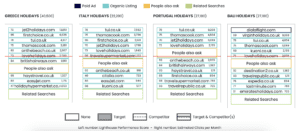
(Source: Embryo Intermingle)
At Embryo, we have a phenomenal tool “Intermingle” that helps us to develop a strategy that will whisk you away to your dream destination (or ranking position).
Here we can see that for some top holiday search terms, the SERPs are filled with high Domain Ranking (the number of the left) websites. Unsurprisingly the results also show both inline images and “people also asked” questions.
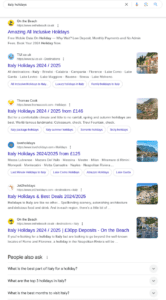
(Source: Google)
By using this tool we can see that building authority across your website, having optimised images and videos and well-targeted user-focused content are three areas that will help drive an SEO strategy for a travel website. So let’s take that into account.
That’s the background, so where should we start?
Across all SEO strategies, there are three primary ways to optimise your website: content optimisation, technical improvement and authority building. Let’s start with content…
Building your content strategy for your travel website
1) Trends
As we can see above, the online market demand for holidays and travel tends to follow the same trend line year on year. It can take a few months for SEO to kick in so plan your content accordingly. If you know your audience spends their winter break researching where to go in the new year, start increasing your user-focused content towards the end of the year.
If a certain event is happening in a destination you have flights and/or a hotel for, make sure you have content capturing frequently asked questions or the more commercial short-tail keywords. For example, we can see below that “japan holiday” tends to peak in January shortly before the Japanese spring cherry blossom season so I would be scheduling content towards the end of the year to be ranked in January.

(Source: Google)
2) Short-tail vs long tail
This nicely takes me onto how you can plan your holiday content strategy. There are so many opportunities for providing valuable content to your audience (and Google bots) across the travel industry.
When planning your content, think of the full customer journey and make sure to target:
- Short tail keywords such as “cheap holidays 2024” to capture potential customers who have just started considering their next holiday
- Medium tail keywords such as “cheap holidays in spain 2024” for those customers who have their next destination in mind
- Long tail keywords “best deals for elba costa ballena beach & thalasso resort in spain” for customers who know exactly where they are looking for and just want the best price
(and don’t forget to work with your PPC team and consider retargeting adverts)
3) User-focused content
And the opportunities for content don’t stop there. Don’t forget about user-focused content to not only target those who are at the start of their purchase journey but also to target customers who don’t care where they go, ‘it just needs to keep the kids busy’.
A clear example of this is with On The Beach. Not only have they focused on a “problem” – keeping the kids entertained.
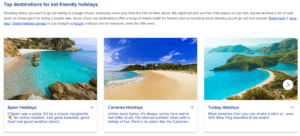
(Source: On The Beach)
Travel user-focused content allows you to sell the dream while also capturing the attention of a large audience. The right content in your SEO strategy will help build your EEAT (experience, expertise, authoritativeness and trust), may lead to backlinks building your authority and even get you a ‘real estate’ stealing snippet or two.
Technical SEO for your travel website
We’ve already spoken about how the SERPs for the travel industry are a crowded market. This is why SEO strategies for travel websites must include a technical element. If your website is slow or has several errors, customers will get frustrated and leave for a competitor’s website.
4) PageSpeed
Google PageSpeeds Insights refers to how quickly a page loads, how much it moves around and how fast a customer can interact with your website.
42% of people would leave a website because of poor functionality.
Not only will your PageSpeed scores impact your rankings, but a poorly performing website may also lose you customers.
So why is PageSpeed increasingly important in the travel industry?
Travel websites are likely to have a large number of images and videos (and based on the above SERP research this is something we recommend). Visuals are key to driving traffic and conversions across travel websites, however they must be optimised. Here are some quick how-to-s:
- Use an appropriate file format for the graphic
- Compress images/videos to reduce file size without affecting the quality
- Resize images/videos to match the dimensions of the screen (both on desktop and mobile)
- Use filenames and alt text to improve accessibility and SEO (but do not spam the alt text)
- Implement lazy loading
5) Desktop vs Mobile
Making sure you’re optimised for both desktop and mobile is crucial to building a strong travel website.
Here is a great example of Kayak having both a desktop and mobile homepage:
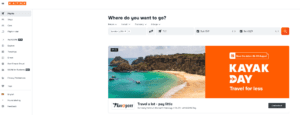
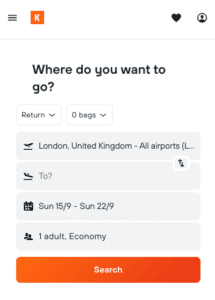
(Source: Kayak)
Across all industries, mobile websites are vital for capturing audiences. According to Econsultancy, 56% of consumers use their laptops to research travel options. However, it’s also become recognised that mobile is becoming a quick way of booking your next hotel stay or holiday.
6) Explore the world of E-E-A-T one bite at a time
We could do a whole blog post on the importance of E-E-A-T (in fact, we have), however, we couldn’t miss this opportunity to talk about the importance of an E-E-A-T strategy across travel websites.
E-E-A-T (Experience, Expertise, Authoritativeness, and Trustworthiness) allows Google to determine the ‘most helpful’ content to rank high in the SERPs. As your audience is looking to spend money with you, proving you have the experience, expertise and authority to speak about the travel industry allows you to build trustworthiness not only with your customers but with Google.
How can you build your E-E-A-T?
- Ask customers to write reviews, especially if you can filter them per package, hotel, flight etc.
- Add author bios for your user-focused content, this shows that your experts with their years of experience can back up what you’re saying
- Provide a clear process map of your booking system, allowing your customers to feel confident in your delivery before purchase
- Note any travel awards that your company or service has won
7) Schemas are your friend, not food (actually they do help you E-E-A-T)
As we’ve seen in the above snapshot from Intermingle, the SERP results for the travel industry cover a wealth of different layouts, from the standard rankings to inline images to the frequently asked questions of ‘People Also Asked’. So how can you take up as much of the SERP as possible? Schemas.
Schemas, or structured data, is a piece of code that sits in the background and highlights to Google key bits of information on your webpage. This allows Google to read your page better and hopefully leads to a special feature in the results page.
Here are our schema recommendations you should build out in your SEO strategy:
Reviews: as mentioned above, reviews help build your trustworthiness for both Google and your customers. Using a review schema highlights these reviews to Google and makes you stand out from the crowd – such as Trivago and Tripadvisor below:
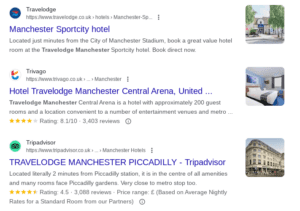
(Source: Google)
FAQ Schema: While Google has reduced the importance of the FAQ schema, there is still a ‘People Also Asked’ set of questions on almost every SERP. Adding an FAQ section to your pages not only enhances your E-E-A-T, but by also adding an FAQ schema you enhance your chances of getting a snippet.

(Source: Google)
Structured data carousel (beta): This is a reasonably new schema set up this year by Google that allows you to highlight certain products in a carousel format known as a rich result
While this feature is only available if your business is based in or serves users in EEA, it’s a very exciting new feature for the SEO travel industry yet to be fully explored.

(Source: Google)
We’ve touched upon the content and some technical optimisation opportunities for SEO for travel websites. Now for the final element of SEO, building authority.
As mentioned in our initial introduction, the results for travel searches are filled with high Domain Ranking websites. Thankfully, as you build out your well-optimised, unique and educational user-focused content it is likely that you will be naturally building links from other websites to yours.
However, there are other opportunities to build upon this. From digital PR to affiliate marketing there are many avenues out there that can support your SEO efforts. Outreaching and building backlinks to your website helps to build valuable links from authoritative websites enhancing your visibility, and credibility and ultimately driving more traffic to your site.
There you have it, our top tips for SEO for travel websites
Just like a well-packed suitcase just under the weight allowance, there is a list of potential opportunities for holiday fun and of course, for search engine optimisation.
If you’ve read this and are ready to jet-set your travel website to new heights of SEO, reach out to our team today. We promise one or two less puns.












